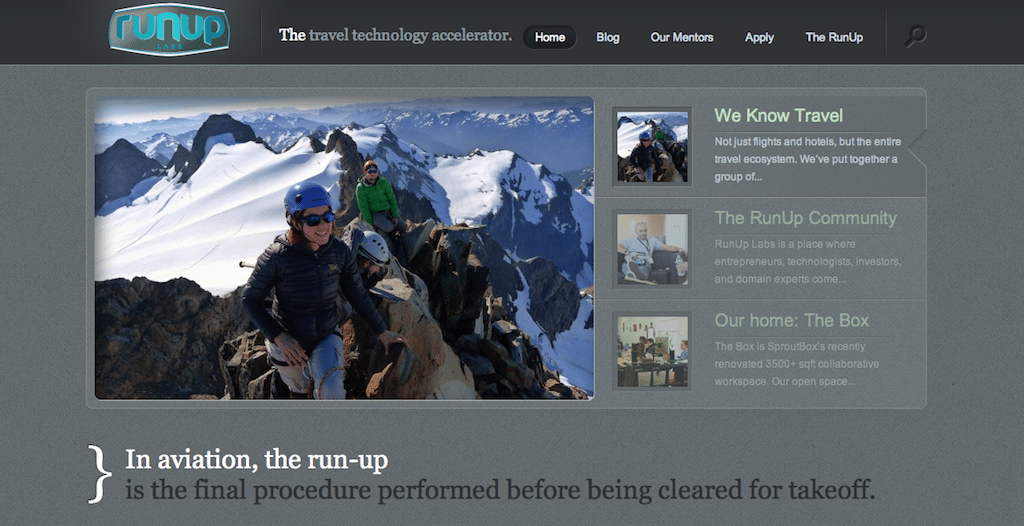Skift Take
We’re interested to see which startups are born from RunUp Labs and where they’ll find their place in the currently crowded market of travel sites and apps.
There are over 60 seed accelerators in the U.S. today. While many programs accept great ideas without focusing in a certain industry, others tackle one specific field. Take Startl’s accelerator program focused on learning/education technologies or Blueprint Health for health tech startups. Now there’s one in the works for travel.
RunUp Labs is the brainchild of venture capital firm Sproutbox and travel industry titan Cornerstone Information Systems. The program, located in Bloomington, Indiana, began accepting applications a couple of weeks ago for its first class of travel entrepreneurs.
How it works
The program will accept up to 10 startups for its first class, which runs from March to May 2013. Founders will be given $20,000 during the program with hopes of raising additional funds in May. Cornerstone CEO Mat Orrego approached Sproutbox with the idea for an accelerator that would push innovation and development in the travel industry.
Sproutbox was one of the earliest in this generation of startup accelerators launching not long after Y-Combinator and TechStars. Brad Wisler, co-founder of Sproutbox, explains the approach he took with the 17 companies that he’s helped fund since 2008.
“Where most of the other programs focused on mentorship that was designed to accelerate the fundraising process, we…focused on product development. We focused on helping entrepreneurs get products built and in the market.”
Wisler plans to apply that concept to RunUp Labs. Cornerstone and up to 20 mentors with extensive experience in the industry will advise the startups and help them test and build their products. Cornerstone, which handles a massive volume of reservation processing for sites like Expedia and Priceline, will open doors to data that is usually expensive and difficult to access.
Additional mentors include Raman Rama, CIO/CTO of JHM Hotels; Stever Barsch, CEO of PackLate.com; and Doug Heinz, founder of a former Sproutbox startup, PathWrangler. Other corporate partners may still join the program.
What they’re looking for
The program is looking for startups that are less Hipmunk and more Airbnb in hopes of fostering business models that create new inventory in the industry rather than just a better way to search and book.
Wisler is also enthusiastic about the growth of the peer-to-peer business. Not so much in lodging where Airbnb has a firm grasp of the current market, but with transportation, flights, cars, and even pet boarding.
“We’re looking for companies that have either (a.) a massive disruption planned for the market or (b.) have a very clear and sustainable revenue model. Hopefully both,” explains Wisler. “The team most likely to be selected will have product and business development. One hacker, one hustler is ideal.”
Ortega envisions “a way to take it from an airport-model to trip-model…a process that focuses on the outcome of what you’re trying to experience rather than the process of getting there.”
When asked about the profileration of travel inspiration sites today and whether they’d be accepted in to the program, Brad replied, “The problem with inspirational sites is that the revenue model is not profitable. They require massive volume to produce any meaningful revenue…it’s hard to make a sustainable business out of that.”
Other incubators
It’s not necessary for a success travel startup to be born from the advice of top travel industry executives. Y-Combinator pumped out prodigy travel startups Hipmunk and Airbnb, but the access to data and backend technologies from companies like Cornerstone will likely push these entrepreneurs lights year ahead of where they could have gone on their own.
The Daily Newsletter
Our daily coverage of the global travel industry. Written by editors and analysts from across Skift’s brands.
Have a confidential tip for Skift? Get in touch
Tags: airbnb
Photo credit: RunUp Labs is specifically designed for startups who aim to change the way we travel. RunUp Labs / runuplabs.com
